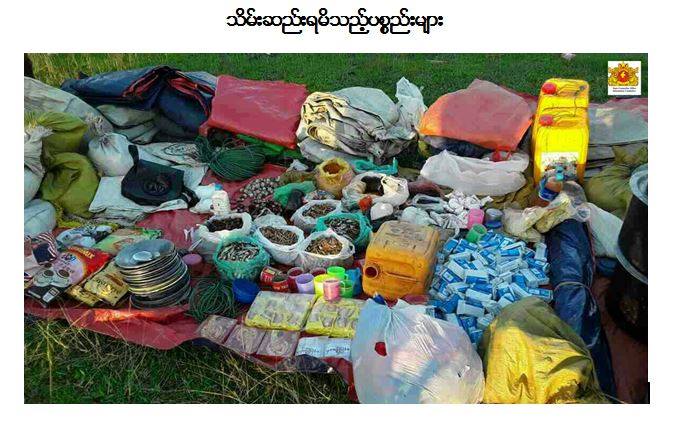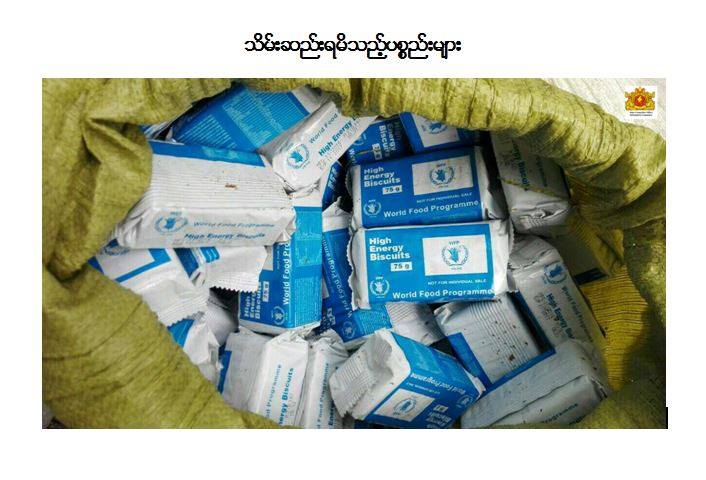The State Counsellor Information Committee reported yesterday that aid from the UN’s World Food Program (WFP) was discovered on July 30 in a “terrorist hideout” in the May Yu mountain range in northern Rakhine State.
The report has stoked anti-UN sentiments among Myanmar citizens, many of whom see attempts to hold Myanmar accountable for its abuses against the Rohingya as part of a global conspiracy to destabilize the country.
According to the Information Committee report, the WFP aid, consisting of 100 packages of high-energy biscuits, was discovered by security forces while they were searching the mountains for a forager named Than Htay, who has been missing since July 27. The biscuits were found in a makeshift shelter along with waterproof sheets, nylon rope, shovels, rice, cooking oil, dried fish, chili powder, other seasonings, betel nut, coffee, and blankets.

Although the report from Aung San Suu Kyi’s office does not mention weapons or any other evidence to support the claim that the supplies belonged to militants, many have interpreted the discovery of the biscuits as evidence that the UN is funding terrorism in Myanmar.
A member of the search party that discovered the items told Eleven: “The items found yesterday in the May Yu mountains, inside terrorist huts, are definitely from international humanitarian aid. It is undeniable and, of course, it shouldn’t be in their hands. The Union government must find out how this happened.”
Rakhine State’s Minister for Security and Border Affairs, Colonel Phone Tint, was even more candid: “It is extremely difficult to determine how terrorists were getting their hands on humanitarian aid items or, indeed, whether certain organizations were directly supplying them.”
Social media users in Myanmar responded to the story by condemning the UN for sponsoring terrorism:


However, others on social media have highlighted the possibility that the supplies belonged to a forager – perhaps even the one the authorities were searching for when they stumbled upon the biscuits.
Another commenter pointed out that the supplies may have belonged to IDPs who fled to the mountains to avoid contact with security forces.
… or a temporary hiding site, as used by IDPS in all of #Myanmar‘s designated “black zones” for decades. For ref: https://t.co/pKpEKm6nde https://t.co/1feFOElLpX
— Kim Jolliffe (@Kim_Jolliffe) July 31, 2017
International aid has been a trigger for tensions between Rakhine Buddhists and Rohingya Muslims since the 1990s, when a concentration of humanitarian aid within Muslim communities aroused resentment among Rakhines.
According to the Global New Light of Myanmar, the Rakhine State government is now investigating the discovery of the high-energy biscuits.
A spokesperson for the World Food Program told Coconuts that the aid organization is also investigating whether the case represents a misuse of food assistance.
“WFP is aware of media reports that high-energy biscuits were found in Rathedaung Township in Rakhine State. We are looking into the authenticity of these reports. Any manipulation of food assistance destined for needy families is classified as theft,” the spokesperson said.
“WFP is providing life-saving food assistance to more than 210,000 displaced and conflict-affected people in Rakhine State and takes any misuse of food assistance very seriously. WFP food distributions are carried out in close coordination with the government and through WFP partners in the most vulnerable communities.”




